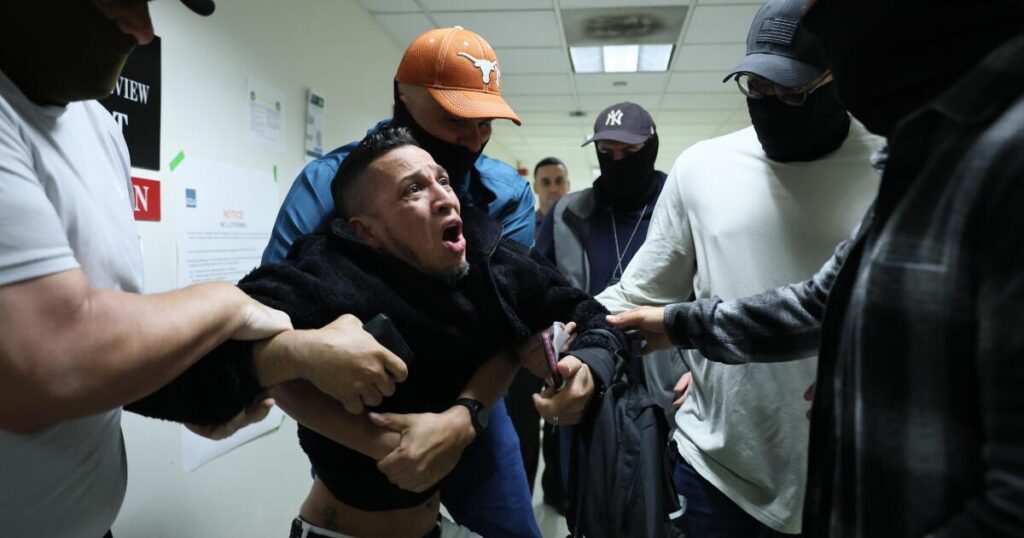Earlier this month, a federal judge in Los Angeles ordered U.S. Immigration and Customs Enforcement to stop denying immigrants detained in a downtown facility the right and opportunity to consult with their attorneys. The important ruling, issued by U.S. District Judge Maame Ewusi-Mensah Frimpong, makes clear that “all individuals — regardless of immigration status — share in the rights guaranteed by the Fifth Amendment.”
Los Angeles isn’t the only place where the Constitution is being ignored. In New York City, a federal judge found that ICE was detaining immigrants in crowded and unsanitary lock-ups while interfering with their ability to meet with counsel. In Chicago, a federal judge ordered ICE to cease its unlawful behavior after hearing extensive testimony about the deplorable conditions inside a suburban detention facility, where immigrants are also routinely denied visits and phone calls with representation.
The Trump administration’s efforts to block immigrants’ access to counsel continues to push even further, including transferring noncitizens to far-flung detention centers where few lawyers practice. In one case, a Tufts doctoral student was sent from Boston to New Hampshire, then Vermont, and later Georgia and Louisiana. Immigrants have even been shipped to extraterritorial detention sites, such as the U.S. base at Guantánamo Bay, Cuba, held hundreds of miles from the nearest attorney.
Although immigrants in detention are afforded the right to consult with a lawyer, they are not guaranteed one be appointed to them at the government’s expense if they cannot afford it, as that right applies in criminal cases but doesn’t protect people facing civil deportation proceedings. Instead, immigrants in detention must either pay for their lawyer or rely on pro bono legal aid to defend them.
As we presented in a study published by the Iowa Law Review earlier this month, access to counsel for immigrants facing possible deportation has expanded in recent years. A rising number of law school graduates have entered the field, and new sources of government and private funding have emerged.
Just over half of immigrants facing removal from the U.S. have found counsel over the past decade, up from 37% between 2007 to 2012. And roughly two-thirds of those immigrants who found counsel succeeded in avoiding a judge’s deportation order, including by having the case terminated or by being granted relief such as asylum by an immigration judge. It’s perhaps not surprising that ICE doesn’t want lawyers involved, even if it means trampling constitutional rights of citizens and noncitizens alike.
In the face of this unprecedented focus on enforcement, lawyers provide a critical link in allowing people to understand their rights, challenge the legality of their arrest or confinement and seek relief. And the need for these essential services is on the rise, as the Trump administration is now attempting to build the largest detention and deportation operation in U.S. history, fueled by $170 billion in funding over the next three years.
Preventing lawyers from meeting with their clients is just one half of the government’s plan. The other half includes cutting off the supply of immigration lawyers.
Soon after President Trump took office in January, his administration canceled federal funding that supported lawyers representing immigrants and children in detention. The White House also began targeting law firms known for pro bono representation, pressuring them to decline matters including asylum cases.
As access to lawyers is under assault, egregious rights violations have proliferated. U.S. citizens have been racially profiled and arrested by masked ICE agents. Without even a hearing or meaningful notice, immigrants have been sent to a maximum security prison in El Salvador known for human rights abuses, where some have reported enduring sexual assault and severe abuse by guards. And in overcrowded jails around the U.S., immigrants have been held in squalid conditions, refused access to essential medical care and denied regular meals.
As the federal court in Los Angeles made clear this month, ICE must allow people in detention to consult with lawyers. At the same time, lawyers must be there to answer the call. States, local governments and generous donors are needed to step up to ensure that funding is in place to support immigrant defense organizations to provide these essential services.
Ingrid Eagly is a law professor at UCLA. Steven Shafer is an immigration attorney at the Esperanza Immigrant Rights Project of Catholic Charities in Los Angeles.
The post Yes, immigrants have the right to a lawyer, but finding one is getting harder appeared first on Los Angeles Times.




